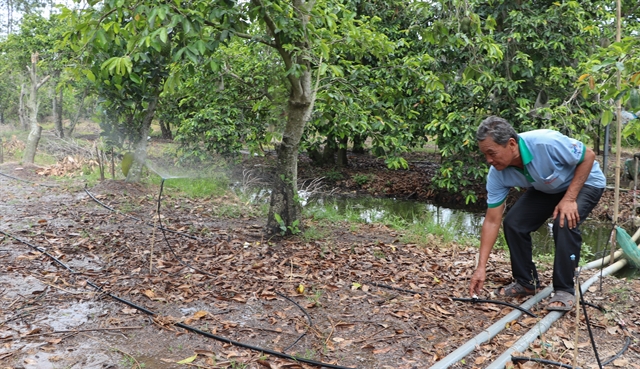 |
| A soursop orchard in Hậu Giang Province’s Long Mỹ District with an automatic irrigation system. — VNA/VNS Photo Hồng Thái |
HẬU GIANG —Hậu Giang Province is developing nature-based agriculture and applying advanced techniques to increase efficiency.
The Cửu Long (Mekong) Delta province is affected by climate change, especially saltwater intrusion in its rivers in the dry season, which impacts agriculture.
To cope, it has restructured cultivation and developed nature-based farming models suitable for each locality.
Long Mỹ District normally suffers from a shortage of irrigation water in the dry season, and so local authorities encourage rice farmers to switch to drought-resistant crops such as soursop.
In the district’s Thuận Hoà Commune, the soil was severely contaminated by alum in the past and farmers could only grow cajuput.
After an irrigation network was created in the commune, farmers switched to rice but yields were low.
In the last 10 years they switched to soursop because the fruit is resistant to drought and saltwater.
Võ Văn Quang, who has a 1ha soursop orchard in Thuận Hoà, said the lives of locals have improved significantly after making the switch.
“My family earns VNĐ80-100 million (US$3,100-3,900) a year from growing soursop.”
The province has developed many nature-based farming models to cope with natural disasters, according to its Department of Agriculture and Rural Development.
In places affected by alum and saltwater intrusion, it recommends a switch to vegetables, livestock, aquatic species, and rice-aquatic species, and seeks to develop ecotourism.
Where rice remains predominant, it develops large-scale rice fields by pooling smaller holdings and increases the use of advanced farming techniques and mechanisation.
Where farmers grow vegetables and fruits, it seeks to use efficient automatic irrigation, researches and creates plant varieties that can grow in saltwater- and drought-affected areas.
It propagates greater use of organic fertilisers and creation of ditches in orchards and fields to store water for irrigation.
Ngô Minh Long, director of the department, said to restructure and develop nature-based agriculture to produce high-quality and diverse products, his agency is developing high-tech, clean and smart agriculture adapted to climate change.
It would research and apply technology, identify suitable crops for each locality, develop concentrated farming areas, and teach farmers growing processes, he said.
It would prioritise crop varieties with high quality and yields that could adapt to climate change, he said.
It would convert fields that grow just rice into ones that alternate the grain with vegetables or aquatic species to adapt to climate change, he said.
Farmlands account for 86 per cent of the province’s total area.
The province is part of the Ministry of Agriculture and Rural Development’s “project to sustainably develop one million hectares of high-quality and low-emission rice cultivation associated with green growth in the Mekong Delta,” and aims to have 46,000ha under rice by 2030 under the project.
It produces 1.1 million tonnes of paddy a year and rice accounts for 40 per cent of its agricultural production in value terms.
Its fruits include seedless lime, green skin and pink flesh grapefruit, soursop, and jackfruit, a lot of it grown to Vietnamese and global good agricultural practices standards.
Farmers also grow vegetables in net and polygreen houses equipped with automatic irrigation.
The province has 32 companies and 38 co-operatives that have linked with nearly 40,000 farmers owning a total of 38,656ha.
OCOP products
The province has embraced the national “One Commune – One Product” (OCOP) programme to improve value, agricultural efficiency and the lives of rural people.
It has 266 OCOP products rated between three and four stars.
The highest rating under the programme is five.
These products are sold nationwide, through many supermarkets, and exported, according to the Department of Agriculture and Rural Development.
Long, its director, said the province has developed more than 20 agricultural and rural tourism sites that introduce and sell OCOP products.
In Phụng Hiệp District, the number of tourism sites has increased from eight two years ago to 10 now. They have linked up with traditional craft villages and OCOP producing establishments to offer tourism services.
They attracted 240,000 tourists last year, up five times from 2022.
Many OCOP making establishments also offer experience tourism for additional incomes.
The Ngọc Đào Goat Milk Farm in Châu Thành A District’s Tân Hoà Commune has six four-star OCOP products – pasteurised goat milk, freeze-dried goat milk yogurt, freeze-dried fermented goat milk, and freeze-dried fermented goat milk with jackfruit, durian and mango.
The farm raises around 350 goats and produces 1,000 litres of goat milk a month. It has been offering tourism services since 2018 and visitors can try their hands at feeding goats and watch the processes of making products from goat milk and also try them.
Tô Thanh Tùng, Chairman of the Tân Hoà People’s Committee, said: “Ngọc Đào Goat Milk Farm is the commune’s only tourism site and attracts many tourists.”
In the absence of other tourism sites to link with the farm, it could not promote its ecotourism strength, he said.
It has petitioned the district and province authorities to invest in developing more tourism sites in the commune and in transport infrastructure for tourists, he added. — VNS
- Reduce Hair Loss with PURA D’OR Gold Label Shampoo
- Castor Oil Has Made a “Huge” Difference With Hair and Brow Growth
- Excessive hair loss in men: Signs of illness that cannot be subjective
- Dịch Vụ SEO Website ở Los Angeles, CA: đưa trang web doanh nghiệp bạn lên top Google
- Nails Salon Sierra Madre
 VnExpress News The News Gateway of Vietnam
VnExpress News The News Gateway of Vietnam





